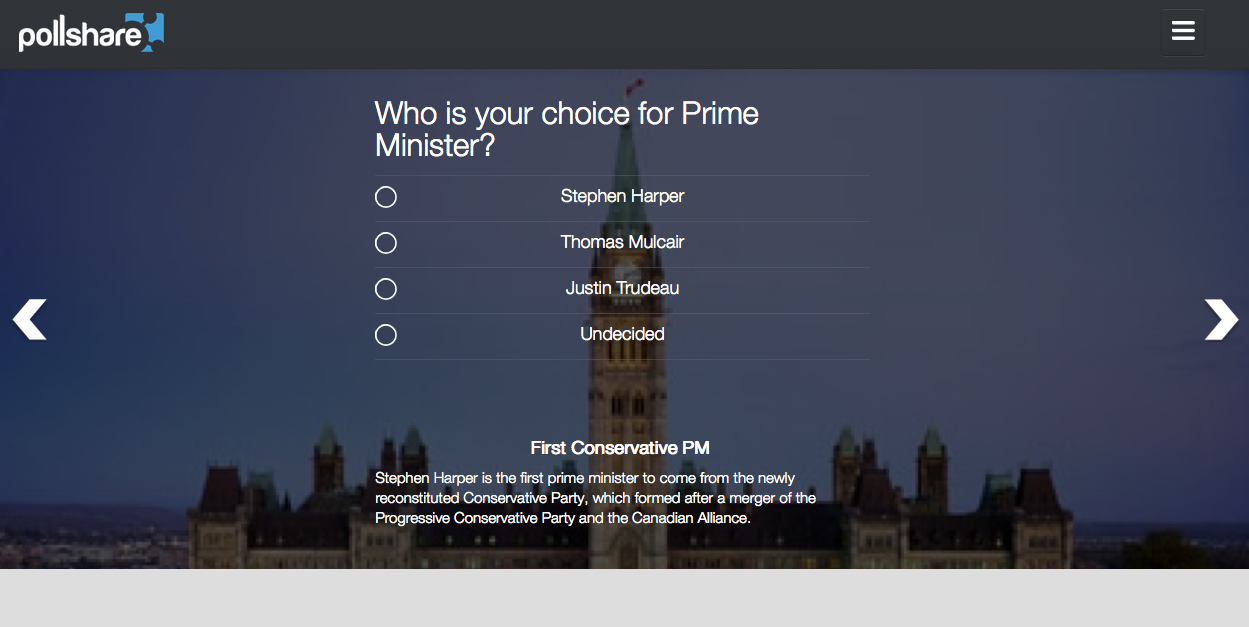Programmatic buying platform ChoiceStream has launched Pollshare, its survey-based audience modeling product, in Canada.
The 14-year old Boston-based company opened its first Canadian sales office in April, hiring former CraveOnline account executive Daryl Stansfield as its Canadian country manager.
ChoiceStream offers a platform for programmatic buying, as well as a data management platform for building and combining audience datasets. It’s done preliminary work with several national Canadian advertisers, including Tangerine Bank, through media agency PHD.
But the company’s main differentiator is a consumer-facing polling site called PollShare that collects data about brand and product affinities within target audiences. It launched the Canadian version of the site in late June.
The new site poses multiple-choice survey questions relevant to Canadian audiences, such as “Do you support marijuana legalization?” “Who is your choice for Prime Minister?”and, in Tangerine’s case, “Are you a Tangerine Bank customer?”
It then pairs the anonymized responses from individual visitors with demographic data from ComScore and other third-party providers to figure out which groups are most likely to be interested in a given brand. That data is then fed into ChoiceStream’s programmatic buying platform to inform the bidding decisions it makes on the exchanges.
PollShare does not collect or tie responses to identifying information like the individual’s name, email address or postal code. Instead, it uses third-party cookies to assess the responder’s demo- and psychographic, and uses any correlations it finds to better define the audience that’s most likely to show brand affinity or purchase intent towards the advertiser. The profiles are used to selectively bid on impressions on the exchanges and target visitors who have the desired attributes (which is often referred to as lookalike modeling).
Speaking to Marketing, Stansfield explained that brands can add their own survey questions to the site to narrow down the target as much or as little as they like. “It allows us to specifically identify and even to define a hard-to-reach audience,” he said.
For example, in the U.S., ChoiceStream worked on a campaign for Dunkin Donuts’ single-serve coffee product launch. PollShare asked visitors “How do you have your coffee in the morning?” and singled out respondents who said they use a single-serve coffee maker. “We were able to take all that information of people who actually have single-serve coffee makers, blend it in with the third party information and other information that we had, and then serve ads.”
Stansfield said that ChoiceStream attracts traffic to PollShare through paid media it places across the web. Visitors that respond to polls don’t get rewards because the company fears that would lead to rewards farming, where consumers click responses randomly to get rewards. Their main incentive is getting to see a real-time chart of how others in their region responded.
In its self-description, the site positions itself as a way for consumers to have their voice heard and influence brands and policymakers, noting that responses will be shared in aggregate with advertisers and politicians. Stansfield described it as “an entertainment-type vehicle.”
According to company numbers, PollShare drew 43,000 unique visitors and 76,000 poll responses in its first 30 days in Canada. Based on its U.S. results, the company expects it can continue ramping up those numbers in the coming months, so that it can more quickly build up the sample sizes it needs to generate meaningful data for clients.











